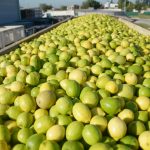Argentine lemon nursery reveals record-setting secret
The world's largest lemon nursery owner José Luis Palacios, talks to www.freshfruitportal.com about how Vivero Citrus in Argentina, got into the Guiness World Records' list.
Palacios started growing citrus fruit, predominantly lemons, 35 years ago and now has 551,227 trees in his Tucumán nursery.
His first nursery was a joint venture with his father who left the enterprise due to a drop in the price of lemon processing, sparking a crisis in the industry among growers.
He decided to go it alone growing tomatoes, string beans and peas but discovered revenues were low, with market operators the ones making most of the profit.
"Then I went back to what I liked - plant propagation. Gradually, production increased with 5,000 plants in the first year and 10,000 in the following year.
"I increased the quantity of plants according to orders, which were, and continue to be, directly proportional to the growers' buying power in various export campaigns," he explains.
"We never thought of becoming the largest nursery in the world. Our idea was always to work better together, learn as much from our experiences through meetings, conferences and traveling to countries that are propagating plants using cutting edge technology."
He adds his nursery never set out to beat others.
"With enthusiasm, we are trying to make our plants the best we can, learning ever year to improve our work."
The road to Guiness
Palacios said three years ago he experienced a surge in lemon plant orders. It also received a visit from representatives from the largest U.S. and South African nurseries, whom he had already met in their respective countries.
"They looked at the amount of trees we had and and felt that perhaps there was no other establishment producing more quantity.
"Then we realized that our numbers were significant and and maybe we could achieve the distinction of being the largest lemon nursery in the world."
A year ago they contacted Guinness World Records about their proposal.
 "They told us they had never had an application of this kind for a plant nursery, therefore, they understood they would need to compare us to an already established nursery."
"They told us they had never had an application of this kind for a plant nursery, therefore, they understood they would need to compare us to an already established nursery."
During this period some of Vivero Citrus' customers began withdrawing their plants which meant a total count of plants in situ would not be possible, as required by Guiness.
"For these two reasons we had to try again this year," explains Luis Palacios.
In 2012 they were in touch again with Guinness World Records, who after two months of research found that the maximum lemon tree production was 50,000 and that Vivero Citrus' figure surpassed this.
"The count was conducted by Guinness World Records judge Ralph Hannah, who traveled to the nursery. All beds were counted, both inside the greenhouses, in various stages of propagation and as finished plants."
Palacios said gaining the record was not only an honor for the nursery but also for Argentines.
"We knew that Argentina is the world's leading producer of lemons, with Tucumán accounting for 90% of total production. And now we have the world's largest lemon nursery.
"It means that when we set out to do a job we do it with enthusiasm, seriousness and responsibility and that we excel in the world."
Quality Viveros
Palacios says from 2002 when Argentine citrus exports increased, fruit importing countries imposed more control and international regulations regarding traceability, first with EurepGap and then GlobalG.A.P.
"The new systems of certification of citrus plants are governed by the Law 20,247 and Decree No. 2183/91," he explains.
"They control all nursery propagation. All stages of propagation must be observed from seed to rootstock to certifiy they are free from viruses and quarantine diseases to increase genetic control of certified plants whose material is extracted for citrus plant grafts."
Palacios argues these inspections carried out by agencies on behalf of the Ministry of Agriculture, Livestock and Fisheries (SENASA) the National Seed Institute (INASE) have led to nurseries operating outside the regulations leaving the industry.
He adds that in Tucumán province alone only 15 nurseries met requirements. Palacios is a supporter of tight regulation, arguing that the absence of stringent pest and disease quarantine measures could be a disaster for the country's citrus production.















































